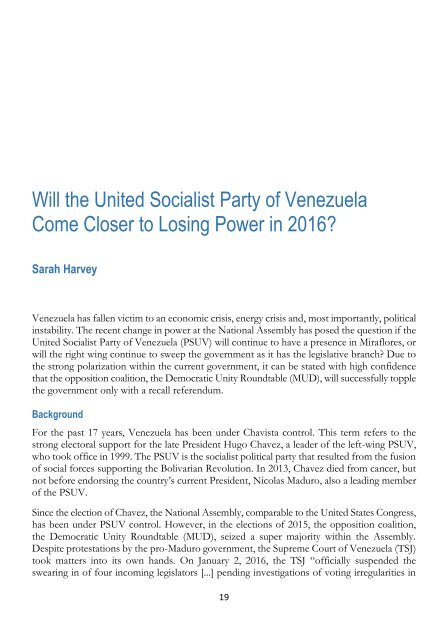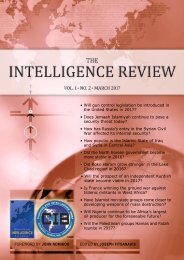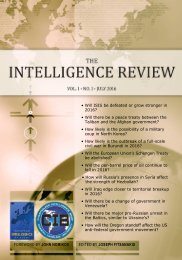The Intelligence Review | vol. 1 | iss. 1 |
This volume is the product of a collaboration between the European Intelligence Academy (EIA) and the Chanticleer Intelligence Brief (CIB), a student-run initiative supported by the Department of Politics at Coastal Carolina University in Conway, South Carolina, United States. Eleven CIB analysts tackle some of the most pressing and timely questions confronting intelligence observers today. Topics range from the price of oil to political stability in Venezuela, from the territorial cohesion of Iraq to the future of the Islamic State, and many other pressing subjects that feature daily in news headlines. CIB analysts propose carefully crafted and informed forecasts that outline future developments in some of the world's most unpredictable hot spots.
This volume is the product of a collaboration between the European Intelligence Academy (EIA) and the Chanticleer Intelligence Brief (CIB), a student-run initiative supported by the Department of Politics at Coastal Carolina University in Conway, South Carolina, United States. Eleven CIB analysts tackle some of the most pressing and timely questions confronting intelligence observers today. Topics range from the price of oil to political stability in Venezuela, from the territorial cohesion of Iraq to the future of the Islamic State, and many other pressing subjects that feature daily in news headlines. CIB analysts propose carefully crafted and informed forecasts that outline future developments in some of the world's most unpredictable hot spots.
- No tags were found...
You also want an ePaper? Increase the reach of your titles
YUMPU automatically turns print PDFs into web optimized ePapers that Google loves.
Will the United Socialist Party of Venezuela<br />
Come Closer to Losing Power in 2016?<br />
Sarah Harvey<br />
Venezuela has fallen victim to an economic crisis, energy crisis and, most importantly, political<br />
instability. <strong>The</strong> recent change in power at the National Assembly has posed the question if the<br />
United Socialist Party of Venezuela (PSUV) will continue to have a presence in Miraflores, or<br />
will the right wing continue to sweep the government as it has the legislative branch? Due to<br />
the strong polarization within the current government, it can be stated with high confidence<br />
that the opposition coalition, the Democratic Unity Roundtable (MUD), will successfully topple<br />
the government only with a recall referendum.<br />
Background<br />
For the past 17 years, Venezuela has been under Chavista control. This term refers to the<br />
strong electoral support for the late President Hugo Chavez, a leader of the left-wing PSUV,<br />
who took office in 1999. <strong>The</strong> PSUV is the socialist political party that resulted from the fusion<br />
of social forces supporting the Bolivarian Re<strong>vol</strong>ution. In 2013, Chavez died from cancer, but<br />
not before endorsing the country’s current President, Nicolas Maduro, also a leading member<br />
of the PSUV.<br />
Since the election of Chavez, the National Assembly, comparable to the United States Congress,<br />
has been under PSUV control. However, in the elections of 2015, the opposition coalition,<br />
the Democratic Unity Roundtable (MUD), seized a super majority within the Assembly.<br />
Despite protestations by the pro-Maduro government, the Supreme Court of Venezuela (TSJ)<br />
took matters into its own hands. On January 2, 2016, the TSJ “officially suspended the<br />
swearing in of four incoming legislators [...] pending investigations of voting irregularities in<br />
19





